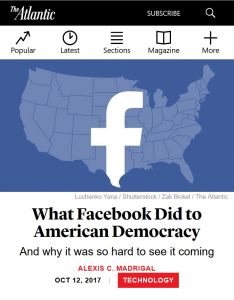Join getAbstract to access the summary!

Join getAbstract to access the summary!
Alexis C. Madrigal
What Facebook Did to American Democracy
And why it was so hard to see it coming
The Atlantic, 2017
What's inside?
Facebook has upended the media world – and changed electoral politics.
Recommendation
While US congressional investigations into Russian meddling in the 2016 presidential elections continue to unfold, journalists are starting to piece together the role Facebook played. The social media giant may inadvertently have helped Donald Trump to his surprise victory. Facebook founder Mark Zuckerberg, who initially dismissed suggestions that Facebook influenced the elections as “crazy,” has now acknowledged the platform’s role in spreading misinformation. Writing for The Atlantic, reporter Alexis C. Madrigal traces Facebook’s rise as the dominant media distributor and its growing impact on electoral politics. getAbstract recommends this article to citizens in democratic countries, who are wondering how a social networking site can turn into an engine of deception and propaganda
Summary
About the Author
Alexis C. Madrigal is a staff writer at The Atlantic.


















Comment on this summary